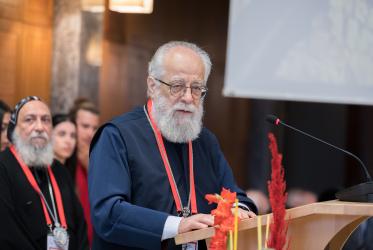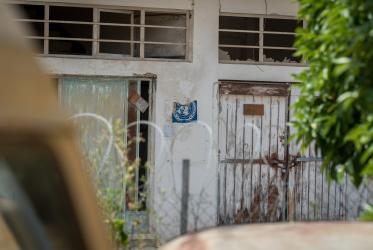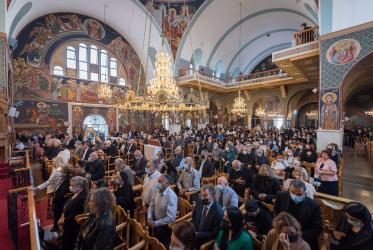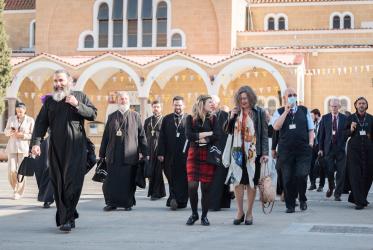Iglesia de Chipre
Cyprus was evangelized from the very beginning of Christianity. The Apostle Barnabas is regarded as the founder and first bishop of the local church, because of his great contribution to the establishment of the new faith and his martyrdom (AD 57). Towards the end of the 4th century, the Church of Cyprus was fully established. Bishoprics were organized in all main towns and church life flourished in all its aspects. The Patriarchate of Antioch wanted to place the church under its jurisdiction, but the Council of Ephesus in 431, and later the emperor, recognized the autocephaly of the Church of Cyprus. Politically, Cyprus became dependent on Byzantium. From the 7th to the 10th century it suffered under the attacks of Arab Muslims. It was in this period that the local church leaders began to assume the political role of ethnarchs, which became gradually established thereafter in the course of the country's history. Cyprus was definitively liberated from the Arabs in 965, and there followed a flourishing of monasticism and Byzantine art. Most of the monasteries of Cyprus were founded in the 11th century.
This progressive course of the church was stopped when the Crusaders conquered the island in 1191. The period of French (1191-1489) and Venetian rule (1489-1570/1) that followed lasted for almost four centuries. The conquerors introduced a Latin hierarchy and took control of church affairs. The Orthodox Church suffered much under the Latin rule. The bishops, priests and monks defended the Greek Orthodox faith and identity (tradition, culture, language) and the faithful gathered around them. Under the Turkish occupation (1570-1878) the Latin church was almost completely extinguished. The Turks allowed only the existence of the Greek Orthodox Church, which was permitted to reconstitute itself. Nevertheless, the Ottoman period was also a time of hardship. The bishops, and especially the archbishop, were the only shelter and protection for the Orthodox people. They were also held responsible by the regime for any problem, disturbance or protest, and many were exiled. During this period, the Ecumenical Patriarchate assisted the Church of Cyprus many times and in many ways.
When the British established their rule over Cyprus, in 1878, the Orthodox Church and people believed that an era of justice, prosperity and modernization would begin, and that the British would allow the fulfillment of the national dream, the union (enosis) of Cyprus with motherland Greece. Unfortunately, nothing of that happened. After a spontaneous protest in 1931, which was violently repressed, the struggle for liberation began in 1955, organized, financed and guided by the Orthodox Church. Archbishop Makarios III, following the long tradition of ethnarchy, was the political leader of the liberating organization (EOKA). He was exiled, but Cyprus became an independent state in 1960, for the first time in its long history, with Archbishop Makarios as its first president.
Unfortunately, the coup d'état of 1974, organized by the junta in Athens, was a disaster for the people, the Republic and the Church of Cyprus. Turkey invaded the island under the pretext of protecting the rights of the Turkish-Cypriot community, occupied 37 percent of the land, and destroyed churches, monasteries, cemeteries and other shrines. Archbishop Makarios, who returned to Cyprus in December 1974, resumed the struggle for the rights of his flock and efforts to rebuild the country upon the ruins left by the invasion. The Church of Cyprus has consistently denounced and opposed the division of the country.
Since independence, the church has developed many and diverse activities, covering all aspects of life and society in Cyprus. It has built many schools and has set up cultural, philanthropic and church foundations, as well as a radio-TV station. Scholarship programmes for needy students have been put in place. The church has established two new bishoprics (Limassol and Morphou) and has initiated missionary activity in Africa. A new (1979) constitutional charter of the church was written to replace the old one of 1914. The Church of Cyprus has become host to many international Orthodox and ecumenical meetings.





